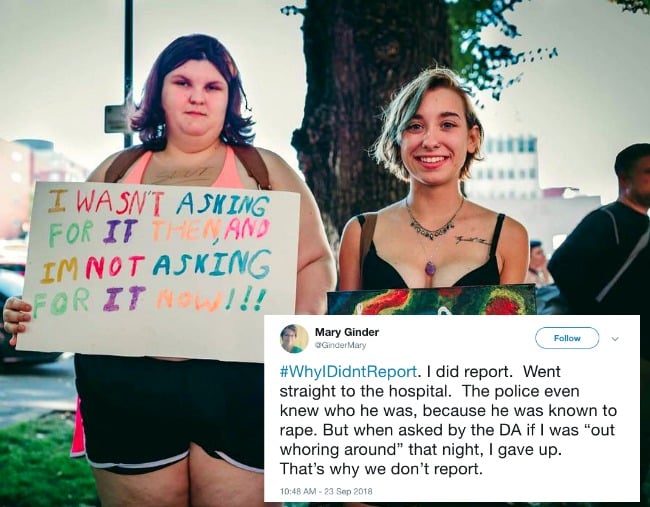
Warning: This post is about sexual assault and may cause distress for some readers.
Last year the #MeToo movement used social media as a powerful protest tool.
Those who were ready to speak about their experiences of sexual assault and abuse went public with their stories, and people were forced to take notice.
You may have seen another hashtag go viral over the weekend. This time, it aims to answer a question often asked of victims: Why didn’t you report it?
Thousands of women and men shared their stories of sexual assault, and why they did not report their abusers with #WhyIDidntReport.
The hashtag was trending online all weekend, and it’s no surprise that reading its messages stir up a lot of feelings: The stories are maddening, powerful and heartbreaking.
Where did the #WhyIDidntReport hashtag come from?
People shared the challenges in reporting abuse after United States President Donald Trump took to his very public diary, Twitter, to question why Professor Christine Blasey Ford, the woman who accused Supreme Court nominee Brett Kavanaugh of sexual assault, took so long to come forward.
“If the attack on Dr. Ford was as bad as she says, charges would have been immediately filed,” he tweeted.
Speaking to the Washington Post, Ford alleged that Kavanaugh and a friend – both “stumbling drunk” – corralled her into a bedroom during the 1980s.

Top Comments
There's this shocking myth among some men that for women, rape is "not that bad".
What makes any man think that having your body brutally intruded upon is in any way OK ?
Women's bodies endure quite a bit during their journey and much of it is courtesy of the men in their lives.
I can see how nuns "get off lightly" much of the time........lol.
I'm saying all this from the perspective of someone who bore two children and was treated well by the men in her life.
Most women are incredibly fastidious, mindful & hypersensitive when it comes to their bodies.
Rape, sexual assault, pain & "rough-play" is never on the agenda.
I was inappropriately touched by my maths teacher who had come to my place (at my parents request) to provide tutoring as i had missed two weeks of school due to a family emergency and I was 4 weeks out from external exams. He also sent me inappropriate text messages. At that time I had already missed a bit of school and I just wanted to sit my exams and get out of there. If I reported it I was scared about what people would say about me as I had already had a bad reputation due to a scum bag of a guy who spread crap about me. My teacher was also just about to be married and can you believe as a 17 year old girl I was worried about it affecting his marriage. At the time I didn't have the capacity to comprehend that reporting would stop it from happening to anyone else. I heard he quit teaching anyway soon after the incident.